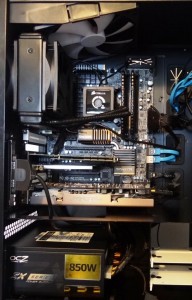BENCHMARK PROTOCOL AND THE TEST BENCH
 This is The SSD Review Test Bench Number One. A quick click on the photo will give you a better look.
This is The SSD Review Test Bench Number One. A quick click on the photo will give you a better look.
In testing, our main objective is to obtain results as pure and as accurate as possible and we want to ensure that no anomalies slip through. Simply put, we want to provide you with the absolute best results the tested hardware can provide. Repetition in testing is standard and, if necessary, we may conduct specific tests in Windows 7 safe mode to ensure the OS has little to no influence on the end result.
In order to validate and confirm our findings, testing is supported by industry accepted benchmark programs. All results are displayed through capture of the actual benchmark for better understanding of the testing process by the reader.
We would like to thank Gigabyte, Corsair, MSI, OCZ, and Fractal-Design, for sponsoring components of our Test Bench.
BENCHMARK SOFTWARE
Software used for testing by The SSD Review consists of ATTO Disk Benchmark, Crystal DiskMark, AS SSD, Anvil Storage Utilities, along wth FutureMark PCMark Vantage. We are even going to throw in a bit of a bonus with some RST SSD caching results as well.
All do a great job of showing us the numbers that we want to see, or dont want to see in some cases, while PCMark Vantage x64 is an excellent program which recreates tests that mimic the average users activity, all the while providing a medium to measure each.
Benchmark software used by The SSD Review can be obtained by clicking on the title of each application as all may be downloaded without cost to the consumer.
ATTO Disk Benchmark is perhaps one of the oldest benchmarks going and is definitely the main staple for manufacturer performance specifications. ATTO uses RAW or compressible data and, for our benchmarks, we use a set length of 256mb and test both the read and write performance of various transfer sizes ranging from 0.5 to 8192kb. Manufacturers prefer this method of testing as it deals with raw (compressible) data rather than random (includes incompressible data) which, although more realistic, results in lower performance results.
 The ATTO result was a bit of a surprise as specifications list the SSDs write performance at 110MB/s, whereas, our tests show an 82MB/s jump which is a nice start.
The ATTO result was a bit of a surprise as specifications list the SSDs write performance at 110MB/s, whereas, our tests show an 82MB/s jump which is a nice start.
 The SSD Review The Worlds Dedicated SSD Education and Review Resource |
The SSD Review The Worlds Dedicated SSD Education and Review Resource | 
how do you explain that write transfer rate through the cache is better than direct access to HDD? since anyhow the data has to be written to HDD, the performance is based on the Weakest point, i.e the HDD tyhroughput? (may be i write here spupidities but since I am not an expert, I take the chance…
Whether people care to believe so or not, much synthetic testing actually mimics reality. In the case of the HDD vs the cached HDD, it is particularly so. First and foremost, the cached HDD starts and shuts down considerably faster than the regular HDD. This is because the large cache retains frequently used information for access quickly, much as a carpenter secures his tools in a locked room or a new home rather than out in his truck. The tools are quicker to retrieve and, therefore, the work gets done quicker. The cached HDD is much the same and the beauty of this system is that, even in typical use, the cached HDD is visibly quicker in all applications than the regualr HDD. Hope this helps.
Gna buy the lenovo thinkpad twist!
Plan to use iTunes quite frequently due to my iOS devices
It has a 7200rpm 500gb hdd+24gb mSATA
Will it load fast?
Yes it will load faster than a hard drive but the end result is probably that of a cached hard drive if they are configuring as such.
I have a Lenovo y580 without any ssd and its motherboard does not support SRT. It only has an empty msata slot and i am planning to buy a small ssd(32gb or 64gb) for caching. Does the mydigital super cache already have a caching software in its firmware or do we have to install a third party software. Also which cashing software (available to the consumer) would you recommend?